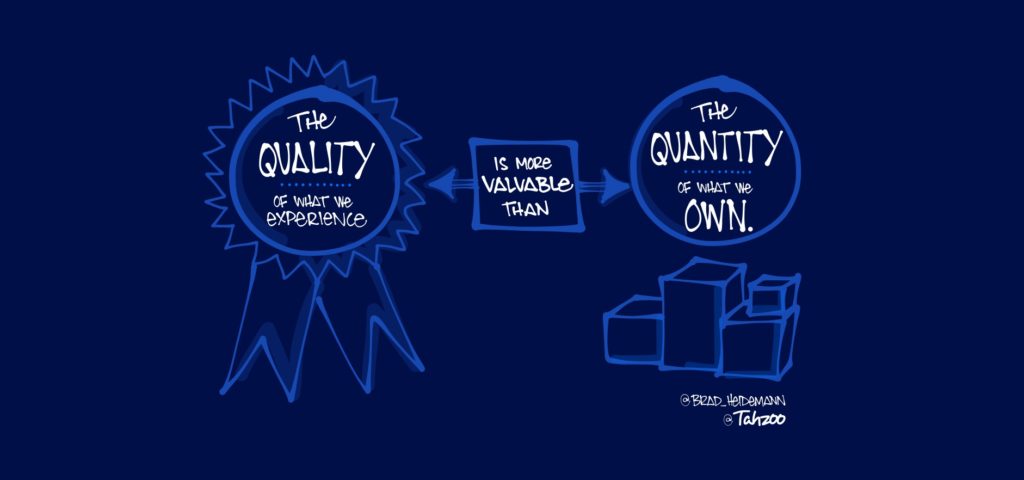This concept of the experience economy I have been talking about for the past two weeks is a fundamental shift in the American system of values. People no longer care what goods you have; they care how good you have it. This is not just my speculation. It’s been documented scientifically.
There is a large body of research showing that “contrary to expectations, life experiences are a better use of money than material items. Essentially, what happened was our value system shifted from things to experiences. This was quickly and increasingly reflected in the economy—the “experience economy.”
Here are a few examples; Uber blended car-sharing and ride-sharing to totally transform the experience of getting from point A to point b. Make no mistake, Uber is a very practical and valuable service, but it is also an amazing experience. I press a button, a car arrives, I pay. Done. I remember the first time I used Uber. My only thought was, “This is amazing.” In the same vein, AirBnB ubered the hotel business. Suddenly, each of us had a living room and a well-appointed kitchen in practically every city in the world. The mathematics of the Experience Economy was pretty simple: Sharing plus experience is economics. The uber-example of the experience economy, however, is Netflix. That company has reshaped itself three times and each time it has trumped the old industries that once stood in its place. First, it was mail-ordered DVDs, which sounded the death knell for Blockbuster Video and it’s the late-fee revenue model. Next, it was streaming movies, which will someday destroy the cable industry. And, most recently, when Netflix learned that cable and the movie studios could limit the growth of streaming by tying up the content for extended periods, Netflix pivoted yet again and became a producer of high-quality, high-demand content like “House of Cards” and “Orange Is the New Black.” Game, set, match: Netflix.
It’s the Experience Economy, and it’s changing not just what people buy, but why. And what, exactly, will be the impact of the Experience Economy? Well, we are already seeing it in the fact that sharing has become more important than owning… You don’t need a new drill, you need a hole, so you rent the drill. You don’t need a vacation, you need a destination, so you rent the apartment wherever you want to go. The Experience Economy is changing the way we buy, too. According to a recent study, hotel revenue has decreased by 8-10% in AirBnB’s most popular markets. According to 2015, Alixpartner’s study of the 10 U.S. metropolitan car-sharing markets, each shared vehicle displaces 32 personal vehicle purchases, equally roughly 500,000 vehicle purchases avoided in the last decade and forecast to avoid 1.2 million sales by 2020. The Experience Economy is even changing the way we communicate. Now, all our experiences, from the most mundane to the truly transcendent, must be shared. Our lives are inherently interactive. We live in the instant with our lives are displayed for all the world to see on multiple channels and myriad devices the minute they happen… Be here now. Indeed.
Mostly, however, the Experience Effect is changing how we do business. This is where Tahzoo comes in. No longer does one-size-fits-all content suffice. Today’s leading businesses need to consider everything they do in terms of “The Experience.” This goes for every company I know. If you make three-dimensional products; good for you, but that product is an experience. Look to the iPhone for inspiration, it’s as much an experience as a phone. If you provide a service, even better.
We live in a service economy. Services are experiences, too. Technology has allowed us the privilege of learning what our customers want, need, and desire and we can use that information and some pretty remarkable technologies to meet them on their terms. We can speak to them in their language and we can treat them to experiences they really care about. This is what the customer experience is meant to be. For you and me as individuals, the Experience Effect means we will increasingly define our experience by our ability to share them with our families, with our friends, and with the world. For the businesses of the world, the Experience Economy will mean understanding that no matter what product or service we deliver, we are ultimately delivering an experience, some make that experience something different, something memorable. And lastly, companies must be honest and truthful about the experiences they create. Only when experiences are sharable, different, and authentic can they truly transcend.
The Experience Economy is real and it is changing the world. It has already altered every business on the planet and it will continue to do. Now, more than ever, the quality of what we experience is more valuable than the quantity of what we own.
Let’s use that knowledge—and this moment in time—to change the world.
